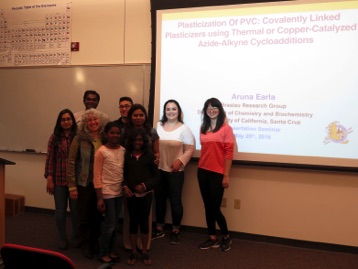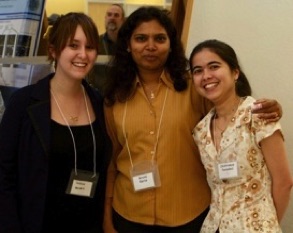Dr. Aruna Earla
Thesis abstract:
One of the most effective approaches to avoid migration of plasticizer from PVC material is to covalently attach the plasticizer to the polymer. In this thesis, the plasticizers are attached to PVC using (2+3) azide-alkyne cycloaddition reactions. In the first approach, PVC was modified by covalently linking triazoles of the most common phthalate plasticizer di(2-ethylhexyl phthalate) (DEHP). Copper-free
azide-alkyne (2+3) cycloaddition reaction of PVC-azide with electron-poor acetylene dicarboxylate is utilized to modify PVC. The glass transition temperature of the modified PVC was lower than the glass transition temperature of the unmodified PVC, indicating successful plasticization. Derivatives of DEHP are covalently bonded to PVC using either thermal or copper-catalyzed (2+3) azide-alkyne cycloaddition reactions. Two DEHP derivatives bearing a tether ending with a terminal alkyne were synthesized and covalently bonded to PVC. The derivative with an ether tethered alkyne undergoes cycloaddition with PVC-azide under copper-catalyzed conditions whereas the ester tethered alkyne derivative undergoes Huisgen thermal cycloaddition. The investigation of glass transition temperatures of these modified PVC samples indicate that the ether-alkyne derivative is more efficient in imparting plasticization to PVC compared to the ester-alkyne derivative.
Although the bulk of this thesis work is on the plasticization of PVC, a part of this thesis deals with the synthesis and spin-trapping properties of polymer-supported trifluoromethylated cyclic nitrones for the detection of free radicals in aerosol particles. Polystyrene tethered with a fluorinated nitrone spin-trap is used as a solid phase in continuous flow NMR and EPR studies of free radicals.
Three fluorinated alkoxyamine initiators are synthesized and used to study the effect of adding carbon dioxide-philic fluorinated fragments in the nitroxide-mediated precipitation polymerizations of styrene in supercritical carbon dioxide. Two alkoxyamines have fluorinated functional handles built onto the nitroxide part of the alkoxyamine whereas the third initiator has a fluorinated functional handle on the benzyl-initiating fragment of the alkoxyamine. The partitioning of fluorinated nitroxide derivatives in supercritical carbon dioxide impacts the controlled/living character and broadening of the molecular weight distributions, but does not have any significant effect on the rate of precipitation polymerization in supercritical carbon dioxide.
Ph.D. 2016: “ Plasticization of PVC: Covalently Linked Plasticizers Using Thermal or Copper-Catalyzed Azide-Alkyne Cycloadditions”
M.S. Biotechnology & Chemical Science, Roosevelt University, Schaumburg, IL
M.S. Organic Chemistry, Maharaja Sayaji Rao University, Gujarat, India
Bachelors of Science: Chemistry, Maharaja Sayaji Rao University, Gujarat, India
Award:
Outstanding Teaching Assistant Award 2013-2014,
U.C. Santa Cruz, Department of Chemistry and Biochemistry
Aruna is now working at Ricerca as a synthetic organic chemist

Publications with the Braslau Group:
1. Braslau, R.; Schaffner, F., Earla, A. "Polymeric phthalates: Potential non-migratory macromolecular
plasticizers" Journal of Polymer Science Part A-Polymer Chemistry 2013, 51 (5), 1175-1184.
2. Earla, A.; Braslau, R. "Covalently Linked Plasticizers: Triazole Analogues of Phthalate Plasticizers
Prepared by Mild Copper-Free "Click" Reactions with Azide-Functionalized PVC" Macromolecular
Rapid Communications 2014, 35 (6), 666-671.
3. Magee, C.; Earla, A.; Petraitis, J.; Higa, C.; Braslau, R.; Zetterlund, P. B.; Aldabbagh, F. "Synthesis of
fluorinated alkoxyamines and alkoxyamine-initiated nitroxide-mediated precipitation polymerizations
of styrene in supercritical carbon dioxide" Polymer Chemistry 2014, 5 (19), 5725-5733.
4. "Phthalate Plasticizers Covalently Linked to PVC via Copper-Free or Copper-Catalyzed Azide-Alkyne
Cycloadditions" in preparation.
5. "Polystyrene Supported Cyclic Fluorinated Nitrones: Spin Traps for Transient Free Radicals in the
Atmosphere" in preparation.



